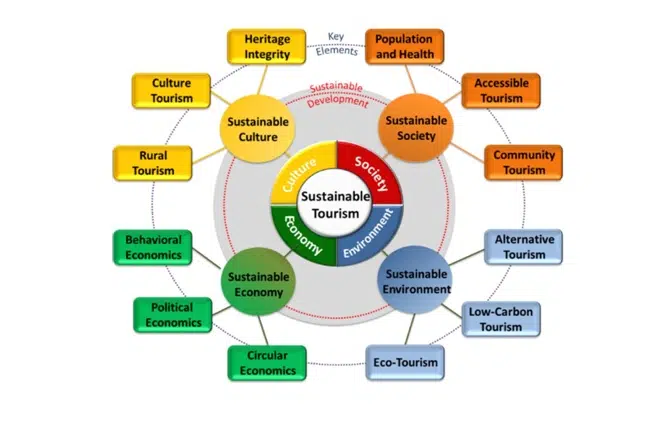
Global Impacts of Sustainable Tourism
Every Coin has two sides:
Tourism is one of the largest industries in the world and undoubtedly the fastest-growing one. It is among the top five export categories for 83% of the countries and is the main source
of GDP gro
Global Impacts of Sustainable Tourism
The global impacts of sustainable tourism include several areas. For instance, environmental, social, cultural, and political.
Global Impacts of Sustainable Tourism; Environmental Impacts
As early as 1973, critiques started pointing at the environmental challenges caused by the ever-expanding tourism industry. The issue of land, water, and air pollution was highlighted, along with the risks of Global warming, climate change, and landscape destruction.
Keeping these concerns in view, sustainable tourism focuses on minimizing environmental hazards. One of the global impacts of sustainable tourism is responsible and green tourism. The concept of responsible tourism gives the tourist the responsibility of taking care of the environment of the tourist site. Moreover, tourists are encouraged to control carbon emissions and spend time more harmoniously with the environment.
Global Impacts of Sustainable Tourism; Social Impacts
Tourism brings people of contrasting backgrounds and cultures into close contact. While in the past, such contacts were not regulated and taken for granted, Sustainable tourism emphasizes social acceptance.
Sustainable tourism aims at educating and encouraging tourists to interact with the society and social structure of the host country without causing harm to any societal norms. The famous quote, When in Rome do as Romans Do explicitly states the social principle of sustainable tourism.
Global Impacts of Sustainable Tourism; Cultural Impacts
You might have heard of the term, Clash of Civilizations. The clash of civilizations and cultures is not confined to wars and political fronts, rather it also is part of the Tourism industry. People from diverse backgrounds, having contrasting views and varying mindsets, were brought together through tourism. This led to the phenomenon of cultural change and eventually cultural loss.
Sustainable Tourism focuses on giving due importance to every culture. It is based on the belief in respecting others’ cultures while maintaining your own identity. It places a responsibility on both the tourists and the hosts to interact in a culturally friendly way without any cultural change, prejudice, or clash.
Global Impacts of Sustainable Tourism; Political Impacts
In the globalized world, every phenomenon is related to another in a close and complex matrix. With tourism, we observe cultural, political, and economic developments. Sustainable tourism is paving the way to create better political affiliations and trade routes between countries.
It enables countries to strengthen ties by offering incentives for easy travel to other countries. These incentives, in turn, create a friendly and peaceful image of the host country on a global front and can be part of a successful foreign policy.
Global Impacts of Sustainable Tourism; Economic Importance
Tourism is becoming a key revenue generator for numerous developing countries while contributing huge sums to developed economies. Globally, travel and tourism’s direct contribution to GDP was approximately 5.8 billion USD in 2021 and is expected to reach a staggering 8 billion USD in 2022.
The economic importance of sustainable tourism can not be overlooked. The industry supports several other economic giants both directly and indirectly. There are three kinds of businesses that are related to Sustainable tourism in particular and Tourism in general.
Primary Trades
These include all direct components of tourism, including transport, tour agencies, accommodation, food and sanitation, and tourist spots. While traditional tourism caused severe challenges to economic development despite the revenue generated, sustainable tourism is focused on providing more inclusive solutions.
Sustainable tourism encourages the development of strategies that reduce the exploitation of resources, both human and mineral. Low fuel consumption, responsible and green tourism, and tourism for all are some of the key features of sustainable tourism. These features help in the economic development of a nation by minimizing the burden and reducing the disadvantages of mass tourism. For instance, responsible tourism leads to lower fuel consumption by tourists as they prefer other means of transport. This one of the primary global impacts of sustainable tourism.
Secondary Trades
These include retail shopping, banks, insurance, entertainment, and leisure activities. The secondary trades benefit from the principles of sustainable tourism that focus on using local products. The local market is supported by sustainable tourism by creating more demand. This in turn leads to revenue and job production.
The global impacts of sustainable tourism is also represented by the fact that it promotes local activities and nature bonding. Spending more time in nature, away from the hassle and pollution of life results in lower consumption of fuel and power.
Tertiary Trades
The institutes provide the basic infrastructure and support for tourism. For example, public sector services, food, and manufacturing. Sustainable tourism aims at achieving harmony between nature and human activities which can result in better travel opportunities. This leads to the development of better infrastructure that is well-planned.
Conclusion
The global impacts and economic importance of sustainable tourism are crystal clear and immensely impactful. The global impacts are responsible for a better tourist experience; smooth functioning of the tourist industry, and a harmonious travel plan. Sustainable tourism ensures the safety of both the culture and heritage of the host country and area. Moreover, the concept of responsible and green tourism helps in reducing the looming environmental issues.
Economically sustainable tourism is opening new horizons of trade and commerce. It is not only creating better opportunities for the primary trades but also supporting the secondary and tertiary trades. With sustainable tourism, the over-exploitation of resources is discouraged. Low fuel consumption helps in reducing imports.
Additionally, sustainable tourism is focused on promoting local markets and organic food. This helps in the economic development of the tourist area and creates greater demand for local products. Which in turn leads to greater economic activity and revenue generation.




